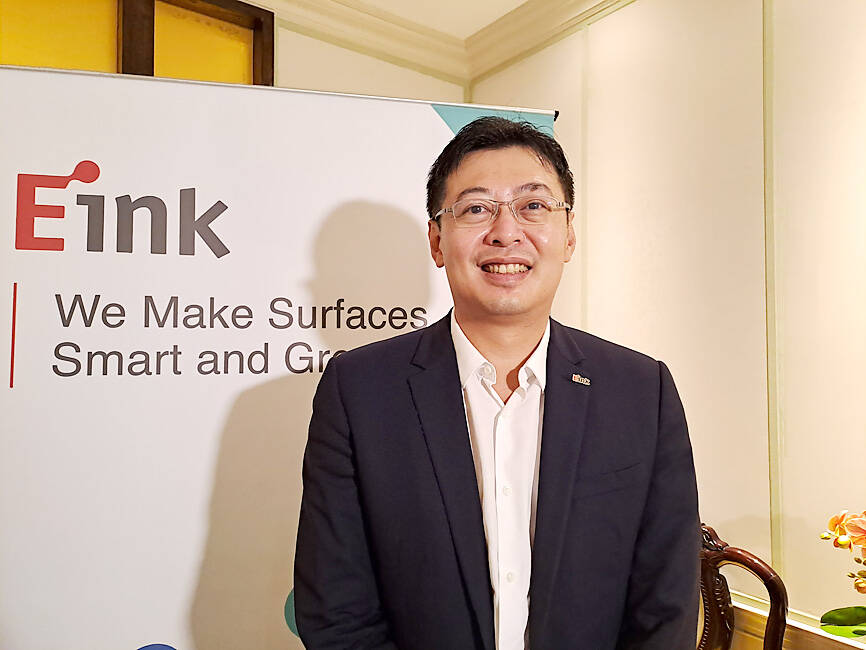E Ink Holdings Inc (元太科技), the world’s sole e-paper display supplier, yesterday said it expects revenue to grow by as much as a low double-digit percentage this year, citing robust demand for electronic shelf labels (ESLs) from retailers, but sluggish consumer demand for e-readers and e-notes that might diminish the company’s overall growth strength.
The Hsinchu-based company said it is bullish about the adoption of ESLs in the US and Europe as staff shortages and frequent price adjustments amid high inflation entice retailers to shift away from traditional shelf labels.
“We are optimistic about the ESL business. We are seeing a strong intention to install electronic shelf labels,” E Ink chairman Johnson Lee (李政昊) told a media event in Taipei yesterday.

Photo: CNA
Customers increasingly explore the usage of ESLs for signage in public spaces and for advertising on public transportation, Lee said, attributing the trend to e-paper displays becoming bigger and better at displaying colors.
E-paper displays used in ESLs have since the third quarter of last year been the firm’s biggest source of revenue.
However, the firm said it is concerned that further interest rate hikes by central banks could dent the growth of the world economy and dampen demand for e-readers.
E Ink expects revenue from e-readers to decline this year.
Some customers indicated that they might reschedule product launches and roll out new products when the world economy is in better shape, Lee said.
“Overall, we are cautiously optimistic about this year’s outlook. We still look at growth this year compared with last year, but the growth will not be as significant as what we did last year,” Lee said.
From a conservative point of view, revenue is expected to grow by a single-digit percentage this year, Lee said, adding that double-digit percentage growth is possible, depending on the macroeconomic situation, he said.
Last year, E Ink’s revenue expanded 26 percent year-over-year to NT$30.06 billion (US$975.7 million), the best performance in 11 years.
The company said its capacity expansion plans are on schedule, unaffected by macroeconomic developments.
To fuel future growth momentum, E Ink said it would this quarter or next build the fourth of six planned production lines in Taoyuan’s Guanyin District (觀音).
E Ink said it is planning to spend NT$5 billion to NT$6 billion on new facilities and manufacturing equipment this year.
E Ink’s net profits surged to a historical high of NT$9.91 billion last year, up from NT$1.84 billion in 2021. Earnings per share rose to NT$8.69 last year from NT$1.61 in 2021.
The firm’s board of directors has approved a cash dividend of NT$4.5 per common share, representing a 52 percent payout ratio. Last year, the company paid a cash dividend of NT$3.2 per common share.

MULTIFACETED: A task force has analyzed possible scenarios and created responses to assist domestic industries in dealing with US tariffs, the economics minister said The Executive Yuan is tomorrow to announce countermeasures to US President Donald Trump’s planned reciprocal tariffs, although the details of the plan would not be made public until Monday next week, Minister of Economic Affairs J.W. Kuo (郭智輝) said yesterday. The Cabinet established an economic and trade task force in November last year to deal with US trade and tariff related issues, Kuo told reporters outside the legislature in Taipei. The task force has been analyzing and evaluating all kinds of scenarios to identify suitable responses and determine how best to assist domestic industries in managing the effects of Trump’s tariffs, he

TIGHT-LIPPED: UMC said it had no merger plans at the moment, after Nikkei Asia reported that the firm and GlobalFoundries were considering restarting merger talks United Microelectronics Corp (UMC, 聯電), the world’s No. 4 contract chipmaker, yesterday launched a new US$5 billion 12-inch chip factory in Singapore as part of its latest effort to diversify its manufacturing footprint amid growing geopolitical risks. The new factory, adjacent to UMC’s existing Singapore fab in the Pasir Res Wafer Fab Park, is scheduled to enter volume production next year, utilizing mature 22-nanometer and 28-nanometer process technologies, UMC said in a statement. The company plans to invest US$5 billion during the first phase of the new fab, which would have an installed capacity of 30,000 12-inch wafers per month, it said. The

Taiwan’s official purchasing managers’ index (PMI) last month rose 0.2 percentage points to 54.2, in a second consecutive month of expansion, thanks to front-loading demand intended to avoid potential US tariff hikes, the Chung-Hua Institution for Economic Research (CIER, 中華經濟研究院) said yesterday. While short-term demand appeared robust, uncertainties rose due to US President Donald Trump’s unpredictable trade policy, CIER president Lien Hsien-ming (連賢明) told a news conference in Taipei. Taiwan’s economy this year would be characterized by high-level fluctuations and the volatility would be wilder than most expect, Lien said Demand for electronics, particularly semiconductors, continues to benefit from US technology giants’ effort

‘SWASTICAR’: Tesla CEO Elon Musk’s close association with Donald Trump has prompted opponents to brand him a ‘Nazi’ and resulted in a dramatic drop in sales Demonstrators descended on Tesla Inc dealerships across the US, and in Europe and Canada on Saturday to protest company chief Elon Musk, who has amassed extraordinary power as a top adviser to US President Donald Trump. Waving signs with messages such as “Musk is stealing our money” and “Reclaim our country,” the protests largely took place peacefully following fiery episodes of vandalism on Tesla vehicles, dealerships and other facilities in recent weeks that US officials have denounced as terrorism. Hundreds rallied on Saturday outside the Tesla dealership in Manhattan. Some blasted Musk, the world’s richest man, while others demanded the shuttering of his